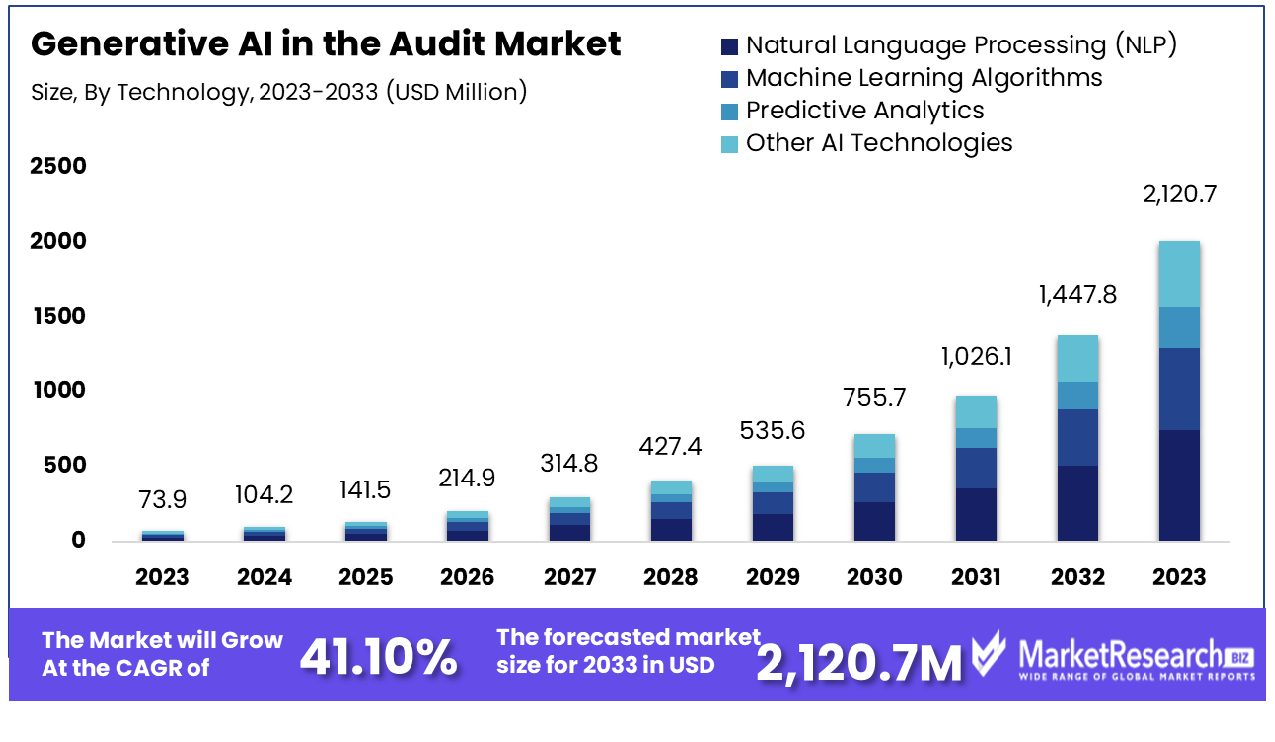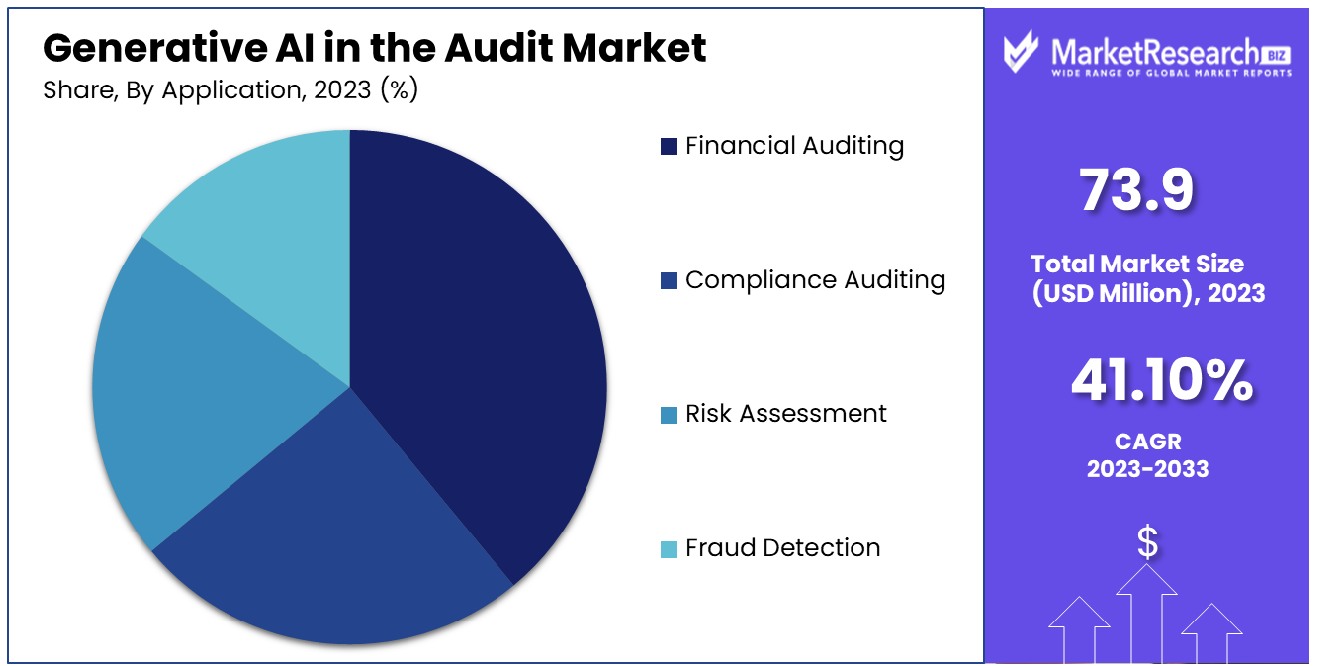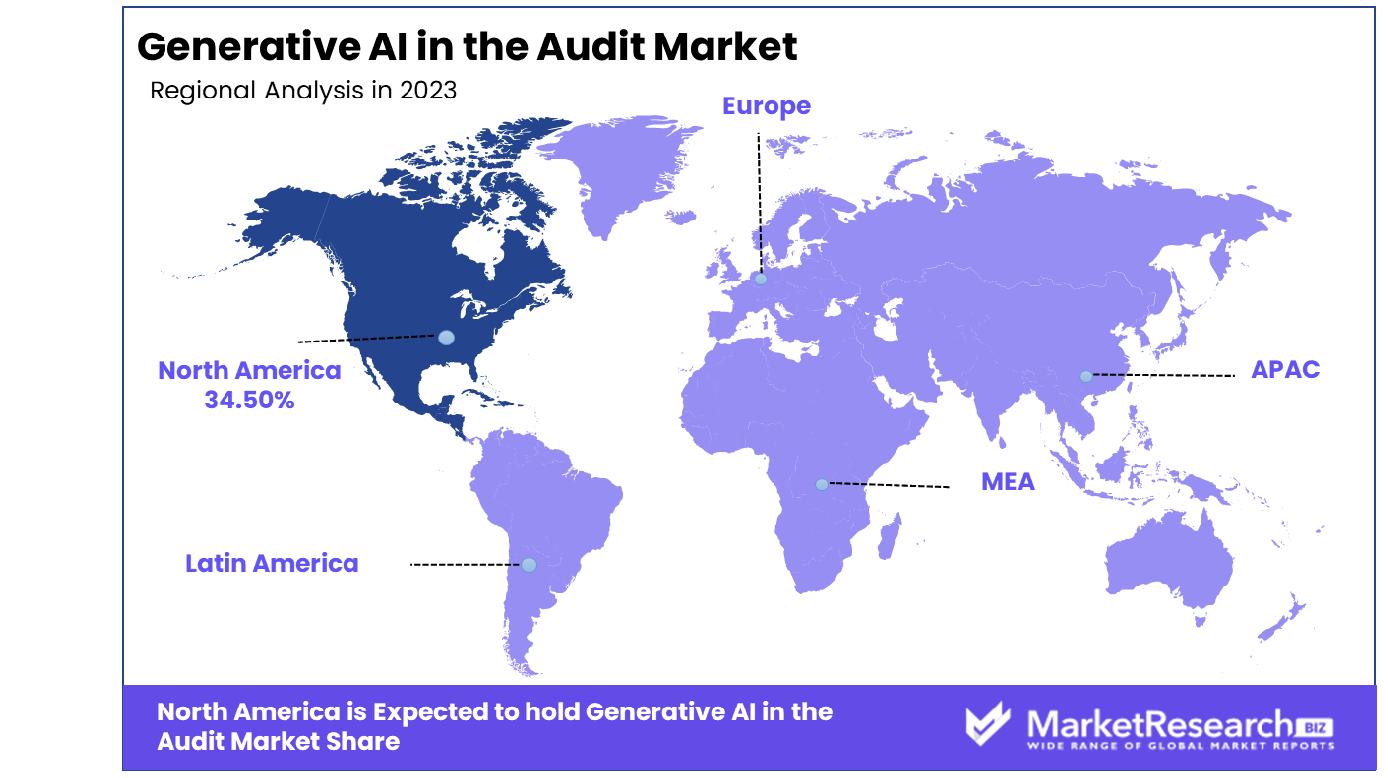
The Generative AI in the Audit Market By Technology(Natural Language Processing (NLP), Machine Learning Algorithms, Predictive Analytics, Other AI Technologies), By Application(Financial Auditing, Compliance Auditing), By End-User(Banking and Finance, Manufacturing, Retail, Other Industries),By Region And Companies - Industry Segment Outlook, Market Assessment, Competition Scenario, Trends, And Forecast 2024-2033
-
42777
-
Jan 2024
-
179
-
-
This report was compiled by Vishwa Gaul Vishwa is an experienced market research and consulting professional with over 8 years of expertise in the ICT industry, contributing to over 700 reports across telecommunications, software, hardware, and digital solutions. Correspondence Team Lead- ICT Linkedin | Detailed Market research Methodology Our methodology involves a mix of primary research, including interviews with leading mental health experts, and secondary research from reputable medical journals and databases. View Detailed Methodology Page
-
Quick Navigation
- Report Overview
- Generative AI in the Audit Market Dynamics
- Generative AI in the Audit Market Segmentation Analysis
- Generative AI in the Audit Industry Segments
- Generative AI in the Audit Market Growth Opportunity
- Generative AI in the Audit Market Regional Analysis
- Generative AI in the Audit Industry By Region
- Generative AI in the Audit Market Share Analysis
- Generative AI in the Audit Industry Key Players
- Generative AI in the Audit Market Recent Development
- Report Scope
Report Overview
The generative AI in the audit market was valued at US$ 73.9 Million in 2023. It is expected to reach US$ 2,120.7 Million by 2033, with a CAGR of 41.10% during the forecast period from 2024 to 2033.
The surge in demand for corporate spending on monetary audits and the requirement of auditing across all verticals of market industries are some of the main driving factors for generative AI in the audit market.

Auditing is described as the evaluation of the precision and reliance of financial and non-financial information, as well as the computer systems and techniques that record and review such information. Professional CAs and certified government accountants perform audit services that are looking ahead to maintain pace with the rapid implementation and progression of modern technologies in this data-driven world.
Many auditors and entities are using automation and analytics, which is the first step in their digital expedition toward a GenAI-enabled audit. GenAI does all the monotonous tasks that offer greater insights and enhance efficacy and quality, which permits auditors to boost their skills, knowledge, and professional decisions. This technology is being used to analyze contract agreements and documents for uncommon terms or clauses that need extra consideration.
According to a survey that was conducted by KPMG in October 2023, the focus was to discover the effect of GenAI on audit methodology. The survey was conducted among 210 business decision-makers in the United States, which includes VPs and above in monetary-focused functions of firms with USD 1 billion or more in yearly revenue and 500 or more employees.
During this survey, it was found that 52% of the employees expected that high AI usage would attract a greater number of talents to financial reporting, and 55% anticipated that AI would expand and boost the accounting industry and auditing teams. In terms of AI implementation in financial reporting, a majority of two-thirds (65%) of employees have implemented the usage of AI in financial reporting, while 36% are using it extensively.
There are several advantages to using GenAI in auditing, such as the fact that, with the help of AI-enabled tools and machine learning, huge volumes of information can be verified and examined to find irregularities and gain insights and patterns that are not deceptive to humans. Auditors are using ML and GenAI to automate their manual tasks, such as documentation. This technology also helps in making forecasts about future risks and guides the completion of a huge volume of organized and unorganized data. The demand for generative AI will gradually expand due to its requirement in financial auditing, which will help in market expansion in the coming years.
Generative AI in the Audit Market Dynamics
Anticipating Accounting Changes Drives Market Growth
Firms are increasingly adopting generative AI to proactively navigate the ever-evolving maze of accounting technology regulations, ensuring clients are always a step ahead. For Instance, PricewaterhouseCoopers (PwC), a vanguard in the Big Four, has pledged $1 billion over three years to generative AI, signaling a major shift in the audit landscape.
Announced in April 2023, this strategic move involves a pioneering partnership with Microsoft, leveraging the impressive capabilities of OpenAI’s GPT-4/ChatGPT and Azure OpenAI Service. This alliance isn't just about adapting to changes; it's about reshaping the future of auditing. Such investments reflect a broader industry trend towards integrating AI for regulatory adaptability, positioning these firms as pioneers in a rapidly evolving audit landscape.
AI-Driven Efficiency Reshapes Auditing Economics
Generative AI serves as an indicator of efficiency within the auditing industry, particularly as audit costs increase. In the U.S., a 4.6% increase in fees for publicly held companies from 2021 to 2022, reported by the Financial Education & Research Foundation (FERF), underscores the pressing need for cost-effective solutions.
Similarly, the UK witnessed a significant rise in audit fees, reaching £7.16 billion in 2016 from £5.92 billion in 2010. Generative AI emerges as a potent tool in this financial landscape, capable of automating repetitive tasks such as reviewing contracts and invoices for anomalies. This not only accelerates the auditing process but also drastically cuts down on labor costs.
AI as a Strategic Lever in Auditing
KPMG's survey reveals a trend toward generative AI adoption in financial reporting, underscoring AI's growing importance as a competitive differentiator. With half of the surveyed finance executives at major companies either deploying or piloting AI solutions and 70% planning broader implementation, it's clear that AI is transitioning from an experimental tool to a core component of auditing strategy.
This shift suggests that firms investing in AI will gain a competitive edge, offering more efficient and insightful audits that clients increasingly value. The trend indicates a future where AI integration may become a benchmark for auditing excellence.
Explainability Concerns Limit Generative AI Acceptance in Auditing
Complex generative models often act as "black boxes," making it challenging to understand and explain their decision-making processes and outputs. This lack of transparency can be a major issue in the audit sector, where understanding the rationale behind findings is crucial for validation and regulatory compliance.
Audit oversight bodies may be hesitant to approve AI tools that lack clear explainability, fearing potential inaccuracies and liabilities. Until AI models can provide transparent and understandable results, their adoption in critical audit processes may be limited.
Cybersecurity Risks Deter Generative AI Adoption in Auditing
Generative models often require training on vast amounts of sensitive and confidential client data. If these AI systems are not secured with robust protections, they could become targets for cyber-attacks, leading to data breaches and significant legal and reputational consequences.
Audit firms, wary of these risks, may hesitate to adopt AI technologies without assurances that their client data will remain secure. Ensuring the cybersecurity service of generative AI tools is crucial for their broader acceptance and integration into audit practices.
Generative AI in the Audit Market Segmentation Analysis
By Technology Analysis
Natural Language Processing (NLP) holds the dominant position in the Generative AI in Audit Market, with a 36% share. NLP's dominance stems from its ability to interpret, analyze, and generate human-like text, which is crucial in auditing documents, financial reports, and regulatory filings. It enables the extraction of meaningful insights from unstructured data, a common challenge in the audit process. NLP technologies significantly enhance efficiency, accuracy, and the scope of audit engagements by automating the review of large volumes of textual data.
While NLP leads, Machine Learning Algorithms, Predictive Analytics, and Other AI Technologies also contribute significantly. Machine Learning aids in pattern recognition and anomaly detection, Predictive Analytics forecasts potential risks and irregularities, and other AI technologies provide additional tools for data interpretation and decision-making, all contributing to a more comprehensive and effective audit process.
By Application Analysis
Financial Auditing is the dominating segment in the application, commanding a 42% market share in Generative AI in Audit. This dominance is due to the critical role of financial auditing in ensuring accuracy, compliance, and transparency in financial reporting. Generative AI enhances the financial auditing process by enabling more extensive data analysis, identifying anomalies, and providing deeper insights into financial statements.

Compliance Auditing, Risk Assessment, and Fraud Detection are other significant applications. Compliance Auditing benefits from AI's ability to ensure adherence to ever-changing regulations, Risk Assessment leverages AI for proactive identification and mitigation of risks, and Fraud Detection uses AI's advanced analytical capabilities to identify fraudulent activities. However, the sheer volume and complexity of financial data make AI particularly transformative in financial auditing, marking its dominant status in this segment.
By End-User Analysis
In the Generative AI in Audit Market, Banking and Finance lead as the dominant end-user segment with a 38% market share. This sector heavily relies on Generative AI for managing complex financial data, ensuring regulatory compliance, and enhancing the efficiency and accuracy of the audit process. The high volume of transactions and the regulatory intensity in this sector necessitate advanced tools like AI for effective audit practices.
Healthcare, Manufacturing, Retail, and Other Industries also integrate Generative AI in their audit processes. Healthcare uses AI for patient data and billing audits, Manufacturing for process and compliance audits, and Retail for financial and inventory audits. Each industry benefits from AI’s capabilities in handling large datasets and providing insights, but the Banking and Finance sector’s need for precision, compliance, and risk management in auditing solidifies its dominant position in this market.
Generative AI in the Audit Industry Segments
By Technology
- Natural Language Processing (NLP)
- Machine Learning Algorithms
- Predictive Analytics
- Other AI Technologies
By Application
- Financial Auditing
- Compliance Auditing
- Risk Assessment
- Fraud Detection
By End-User
- Banking and Finance
- Manufacturing
- Retail
- Other Industries
Generative AI in the Audit Market Growth Opportunity
Predictive Analytics in Auditing Opens New Horizons with Generative AI
Forecasting through generative AI models offers substantial growth opportunities in the audit market by performing predictive analytics to forecast expected financial figures and flag anomalies. Companies like KPMG are pioneering this field with partnerships, such as with MindBridge, to incorporate machine learning technology into their digital audit platforms.
The development and implementation of generative AI in tools like KPMG’s upcoming predictive analytics tool, which is currently in the piloting phase, signifies a transformative shift in the auditing industry. Such advancements allow for more efficient, accurate, and insightful audits, indicating a robust growth potential as these technologies become more integrated and refined.
Personalized Auditing Through Generative AI Enhances Client Specificity and Accuracy
Generative AI's capability to tailor audit testing and sampling for each client based on variables like industry, size, and risk profile presents a significant expansion opportunity in the audit market. This personalization ensures that audits are more accurate and relevant to each client's unique circumstances, enhancing the overall quality and value of the audit.
Models customized for specific types of clients, such as fast-growing startups, can address unique challenges and risks pertinent to those entities. As auditing becomes more sophisticated with AI-driven personalization, the market is likely to grow, driven by a demand for more precise, tailored, and insightful auditing services.
Generative AI in the Audit Market Regional Analysis
North America Dominates with 34.50% Market Share in Generative AI in Audit Market
North America's 34.50% share of the Generative AI in the Audit market is driven by the region's robust financial sector and stringent regulatory environment. The United States and Canada host a significant number of global accounting firms and corporations that require high standards of compliance and audit accuracy. Generative AI audit results are driven by the need to increase efficiency, reduce errors, and manage an ever-increasing volume of financial transactions. Additionally, the region's technological prowess and the presence of leading AI research institutions and tech companies fuel innovation and adoption in the audit sector.

The market dynamics in North America are characterized by a high demand for transparency, accuracy, and speed in financial reporting and auditing processes. Due to increasing regulatory demands and data volumes, more advanced solutions such as Generative AI may be required to provide in-depth analysis and insight. Furthermore, the competitive business environment pushes accounting firms and businesses to adopt AI to gain a competitive edge through improved audit quality and risk assessment capabilities.
Europe: Advanced Regulatory Framework and Technological Adoption
Europe's Generative AI in Audit market is driven by an advanced regulatory framework and a strong focus on technological adoption. Strict compliance and auditing standards as well as the need for effective financial practices support AI technology that uses generative AI. Multinational companies operating across various European markets require state-of-the-art auditing techniques.
Asia-Pacific: Rapid Economic Growth and Digital Transformation
In Asia-Pacific, the Generative AI in Audit market is experiencing rapid growth due to the region's economic expansion and digital transformation. Countries like China, Japan, and India are witnessing a surge in business activities and a shift towards digital financial practices. The need for more efficient and accurate auditing to facilitate this growth spurs the use of artificial intelligence (AI). As the region continues to focus on innovation and improving financial processes, Asia-Pacific is expected to witness substantial growth in the Generative AI in the Audit market.
Generative AI in the Audit Industry By Region
North America
- The US
- Canada
- Rest of North America
Europe
- Germany
- France
- The UK
- Spain
- Italy
- Russia
- Netherlands
- Rest of Europe
Asia-Pacific
- China
- Japan
- South Korea
- India
- New Zealand
- Singapore
- Thailand
- Vietnam
- Rest of Asia Pacific
Latin America
- Brazil
- Mexico
- Rest of Latin America
Middle East & Africa
- South Africa
- Saudi Arabia
- UAE
- Rest of Middle East & Africa
Generative AI Market for Audit is an area crucial to increasing the accuracy and efficiency of financial assessments; listed companies play a vital role in creating transformative solutions.IBM Corporation and Microsoft are technology giants, leveraging AI to revolutionize audit processes through advanced analytics and automation. Their strategic positioning emphasizes innovation, security, and data-driven insights, significantly influencing how audits are conducted and risks are assessed.
KPMG International Limited and Deloitte Touche Tohmatsu Limited, as part of the Big Four accounting firms, integrate AI into their audit services, reflecting the industry's shift towards more comprehensive and predictive analysis audit capabilities. BlackLine, Inc. and SAP SE provide specialized procurement software solutions that incorporate AI for real-time data analysis and financial process automation, enhancing the reliability and speed of audit tasks.
NVIDIA Corporation, with its powerful AI and end-user computing platforms, plays a crucial role in enabling complex data processing and model training for audit applications, showcasing the market's potential for deep learning and predictive analytics. Workday, Inc., and Intuit Inc., known for their financial analysis management and accounting software, incorporate AI to provide more proactive and intelligent auditing features.
Generative AI in the Audit Industry Key Players
- IBM Corporation
- KPMG LLP
- BlackLine, Inc
- SAP SE
- Workday, Inc.
- NVIDIA Corporation
- Intuit Inc.
- UiPath Inc.
- Hitachi
- Microsoft
- Deloitte Touche Tohmatsu Limited
- Other Key Players
Generative AI in the Audit Market Recent Development
- In December 2023, EY (Ernst & Young), a Big Four accounting firm, reported success in using generative artificial intelligence to detect audit fraud. The firm utilized an AI system trained to recognize fraud patterns in the accounts of some of its UK audit clients.
- In September 2023, The role of internal audit in assessing AI programs and related risks was highlighted by Grant Thornton LLP in an on-demand webcast. The event focuses on the evolving landscape of artificial intelligence (AI) and the increasing importance of internal audit in evaluating, understanding, and communicating the impact of AI on an organization's ability to create value.
- In 2022, The IRS introduced a pilot compliance program on June 3, 2022, providing plan sponsors with a 90-day window before an IRS audit to identify and rectify errors in their tax-qualified retirement plans.
Report Scope
Report Features Description Market Value (2023) USD 73.85 Million Forecast Revenue (2033) USD 2,310.05 Million CAGR (2024-2032) 41.10% Base Year for Estimation 2023 Historic Period 2016-2023 Forecast Period 2024-2033 Report Coverage Revenue Forecast, Market Dynamics, COVID-19 Impact, Competitive Landscape, Recent Developments Segments Covered By Technology(Natural Language Processing (NLP), Machine Learning Algorithms, Predictive Analytics, Other AI Technologies), By Application(Financial Auditing, Compliance Auditing, Risk Assessment, Fraud Detection), By End-User(Banking and Finance, Manufacturing, Retail, Other Industries) Regional Analysis North America - The US, Canada, Rest of North America, Europe - Germany, France, The UK, Spain, Italy, Russia, Netherlands, Rest of Europe, Asia-Pacific - China, Japan, South Korea, India, New Zealand, Singapore, Thailand, Vietnam, Rest of Asia Pacific, Latin America - Brazil, Mexico, Rest of Latin America, Middle East & Africa - South Africa, Saudi Arabia, UAE, Rest of Middle East & Africa Competitive Landscape IBM Corporation, KPMG LLP, BlackLine, Inc., SAP SE, Workday, Inc., NVIDIA Corporation, Intuit Inc., UiPath Inc., Hitachi, Microsoft, Deloitte Touche Tohmatsu Limited, Other Key Players Customization Scope Customization for segments, region/country-level will be provided. Moreover, additional customization can be done based on the requirements. Purchase Options We have three licenses to opt for Single User License, Multi-User License (Up to 5 Users), Corporate Use License (Unlimited User and Printable PDF) -
-
- IBM Corporation
- KPMG LLP
- BlackLine, Inc
- SAP SE
- Workday, Inc.
- NVIDIA Corporation
- Intuit Inc.
- UiPath Inc.
- Hitachi
- Microsoft
- Deloitte Touche Tohmatsu Limited
- Other Key Players




